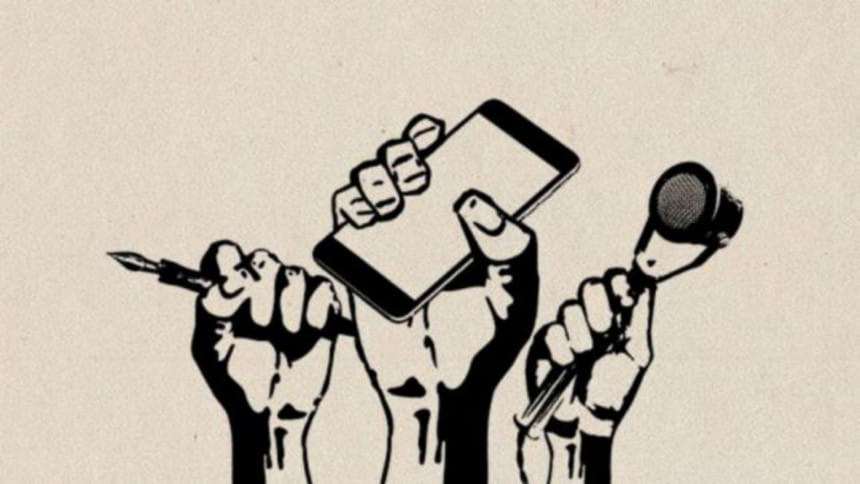Why citizens must speak out against injustice

Freedom of expression lies in everyone's heart—but it must do more than just lie there."
— Judge Andrew Napolitano
The first amendment to the United States Constitution declares that government shall make no laws "abridging the freedom of speech". Legal experts agree that the wording of the amendment makes it abundantly clear that the framers of the Constitution held firm convictions that freedom of speech pre-existed the Constitution, the government and the state, and that the Constitution simply reiterated the truism that the government has no authority to interfere with that.
The answer to the question of the origin of the right to freedom of speech, is that it comes from our humanity, our inherent ability to think and express our thoughts. This right is a part of the fabric that make us humans, and the existence and preservation of all other human values and rights depend on our freedom to exercise this right. Contrary to the general understanding, it is not the function of the Constitution of a state to confer such right, as it is pre-existing, inherent and a part of human make up. By very nature, therefore, it is an inalienable right, and the task of the Constitution is to acknowledge its existence and warn the successive governments to steer clear.
This was well understood by the framers of the US Constitution, and those of others, particularly since the Second World War and promulgation of the Universal Declaration of Human Rights. The right to freedom of expression is ingrained in the natural law tradition and has been articulated throughout human history by such individuals as Aristotle, Thomas Moore, John Stuart Mill, John Locke and others. Writing a piece in this newspaper in November 2019 Professor CR Abrar aptly described freedom of expression as the mother of all rights that essentially distinguishes human beings from animals.
The Constitution of Bangladesh also does not presume to declare right to freedom of expression, but instead guarantees its preservation, thereby acknowledging, in true natural law tradition, its pre-existence.
The question that now hits us in the face is: why is it that a right so fundamental and so uniquely inalienable, gets mercilessly trampled upon time and again by governments throughout the world?
The answer lies in the fifth century philosopher Augustine's theory of libido dominandi—lust for domination. It is a natural instinct of those who aspire for power, to dominate at will. Freedom of expression against the excesses and injustices of those in power, becomes a great obstacle in their journey. Thus the desire to ruthlessly curtail such right is present in all governments, including those who come to power through seemingly legitimate and democratic means. It is worth remembering that even the Third Reich's ascension to power was through democratic norms and manoeuvrings. Human history is littered with examples of governments' relentless will to muzzle their citizens.
In the USA within seven years of the first amendment, president John Adams orchestrated passing of two pieces of legislation, commonly known as the Alien and Sedition Acts 1798, in blatant disregard of the first amendment rights. The Alien Act in many ways resembled the recent Indian Citizenship Amendment Act (except that the targets were French-Americans, not Muslims!). The Sedition Act, which prohibited citizens, among other things, from criticising the president and the congress, mirrored the colonial sedition laws inherited and preserved by the successive governments of the countries of the Indian subcontinent.
This is a classic example of uncontrollable urge of libido dominandi, as many of those involved in passing the Alien and Sedition Acts would have been otherwise decent men, previously involved in drafting the first amendment themselves. Similar examples of governments' legislating in disregard of citizens' natural rights are abundantly evident in India and Bangladesh.
Not unsurprisingly citizens of America took to the street. Many deliberately exercised their right to freedom of speech by criticising president Adams in public thereby provoking arrests and prosecution. In the face of popular protests, the Acts were repealed within two years and president Thomas Jefferson, on assuming office, pardoned all those convicted under the notorious legislation.
No one seriously argues that freedom of expression is an absolute right. As all human beings are equal, the law of nature dictates limitations of freedom of speech when its exercise is harmful to other human beings and interferes with their rights and freedoms. This limitation is also extended to when a historical fact is deliberately distorted causing emotional harm to many, such as Holocaust denial, Armenian genocide denial and denial of the enormous sacrifices made by men and women of Bangladesh in its liberation.
Beyond that, any attempt to limit freedom of expression may be viewed as an exercise of libido dominandi and therefore needs to be resisted. Voltaire was highlighting the enormous value of freedom of expression when he said: "I disapprove of what you say, but I will defend to the death your right to say it".
Bangladeshis, like the Irish of the west, have a proud tradition of speaking out against injustice, exploitation and subjugation for centuries regardless of the costs. Many cultural anthropologists find an uncanny resemblance in the behavioural history of these two peoples. Both peoples were oppressed for centuries and suffered devastating famines and colonial rules, millions of citizens of both countries ventured out of their own shores but never forgot their roots, and both peoples were repeatedly trampled by dark and sinister forces but rose up again and again to assert their rights to live with dignity. The Irish leader De Vera said in 1945 of his Irish brethren (which could easily be said of Bangladeshis too): "That for several hundred years people of Ireland had endured, spoilations, famine, massacres, in endless successions; that they were beaten many times into insensibility, but that each time on returning to consciousness took up the fight anew."
Bangladeshis, in preserving their traditional bravery, must continue to speak out against currently prevalent injustices such as border killings, crossfire killings, forced disappearances, sexual violence, corruption and crimes with impunity, erosion of democratic values and lack of judicial independence, regardless of the costs. Their voices must become louder as the country proudly celebrates the centenary year of the birth of the Father of the Nation. The greatest son of the land would not have expected any less.
"The only thing necessary for the triumph of evil, is for good men to do nothing," said Edmund Burke. These words are a stark reminder as the world watches with baited breath the Indian Hindu nationalist government's repressive designs for its Muslim citizens. Nevertheless, a ray of hope has appeared in the recent days as amongst the ruins of Delhi there appears a green shoot of collective national conscience beginning to find its voice. At this crucial juncture, humankind in general and the citizens of India in particular, would do well to remember the words expressed by German Pastor Martin Niemoller in 1946 on his failure to speak out against the Third Reich: "First they came for the communists, I was not a communist, so I did not protest. Then they came for the journalists, I was not a journalist, so I did not protest. Then they came for the gypsies, I was not a gypsy, so I did not protest. Then they came for the Jews, I was not a Jew, so I did not protest. Finally they came for me, but by then there was no one left to protest!"
Najrul Khasru is a British Bangladeshi barrister and a part-time tribunal judge in England.

 For all latest news, follow The Daily Star's Google News channel.
For all latest news, follow The Daily Star's Google News channel. 



Comments